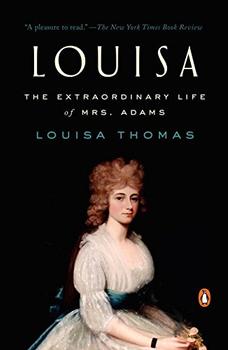Summary | Excerpt | Reviews | Beyond the Book | Readalikes | Genres & Themes | Author Bio

Critics' Opinion:
Readers' Opinion:
First Published:
Apr 2016, 512 pages
Paperback:
Apr 2017, 512 pages
 Book Reviewed by:
Book Reviewed by:
Kate Braithwaite
Buy This Book
1
The first time Louisa Catherine Johnson saw John Quincy Adams, she thought that he looked ridiculous. When he came to dinner at the Johnsons' house in London, on Wednesday, November 11, 1795, the young American diplomat was dressed in a strange boxy Dutch coat so pale that it appeared, absurdly, almost white. Watching him talk at the table, though, she did like him. He seemed spirited, showing no signs of exhaustion after a long and difficult journey from Holland, where he was the United States' representative. He was handsome, with penetrating, dark round eyes under a pair of peaked eyebrows, and a mouth that was full and strong. He liked a good story and a good glass of wine. Only twenty-eight years old, he was already a high-ranking diplomat—and the son of the vice president of the United States. No one who met him could miss his intense intelligence. Still, after John Quincy had gone, the girls sat in the parlor and joked a little about his unfashionable attire. They were drawn to men who wore well-cut jackets, men who arrived at dinner looking ready for a gallop. John Trumbull, an artist and frequent guest at the Johnsons', who had brought John Quincy to dinner, tried to convince them that Mr. Adams was "a fine fellow and would make a good husband." The sisters laughed.
More than a month passed before John Quincy came back, and Louisa did not miss him. She was twenty years old, clever, and charming, though she could be shy, and she and her sisters were accustomed to being objects of admiration. There were seven daughters in all— beguiling, lively, and lovely—and their mother, Catherine, knew how to exploit their good looks. (A seventh child, a son named Thomas, was at boarding school and then across the Atlantic at Harvard.) Catherine was petite and pretty, with a sparkling wit and a talent for putting guests at ease while keeping them on their toes; she was, Louisa remembered, "what the French call spirituél." When they were little, Catherine had dressed her children in matching clothes and marched them into church by twos. "We were objects of general curiosity and permit me to say admiration to the publick," Louisa would remember with a touch of unembarrassed pride. When they were older, the girls had ostrich feathers for their hats, buffons of starched muslin, and hairdressers to curl, sculpt, and powder their hair. They ordered gloves by the dozen. The three oldest—Nancy was twenty-two, two years older than Louisa, and Caroline eighteen, two years younger— had already been introduced to society, and society was happy to be introduced to them.
There were frequent visitors to entertain them, dinners with dignitaries, merchants, scientists, ministers, British abolitionists, wealthy American plantation owners, young men and old. Their elegant house, No. 8 Cooper's Row on Tower Hill, perched above the Thames and the Tower of London, was known as a welcoming place. Visitors from the United States were treated especially well. Louisa's father, Joshua Johnson, a merchant from Maryland, was the American consul in London, appointed by Secretary of State Thomas Jefferson in 1790. He interpreted his responsibilities liberally. (Perhaps a little self-interestedly, too, which was not uncommon for a consul.) His ships carried Americans' mail to and from the United States; he found them a doctor when they were sick; he pled their case when they were in trouble; he offered his house as their haven. Americans came to Cooper's Row to collect their letters and stayed for tea. They came to discuss a trading scheme and found themselves at dinner. After dinner they would linger for card games, conversation, and music in the parlor. They came for the comforts of the sofa in the parlor, the oil paintings on the walls, the cook in the kitchen, the harp in the corner, and the eleven servants who would suddenly appear at their elbow to whisk away their finished plates or materialize in the drawing room with a glass of good brandy. They also came, perhaps, for the women.
Excerpted from Louisa by Louisa Thomas. All rights reserved. No part of this excerpt may be reproduced or reprinted without permission in writing from the publisher.





The Flower Sisters
by Michelle Collins Anderson
From the new Fannie Flagg of the Ozarks, a richly-woven story of family, forgiveness, and reinvention.

The House on Biscayne Bay
by Chanel Cleeton
As death stalks a gothic mansion in Miami, the lives of two women intertwine as the past and present collide.

The Funeral Cryer by Wenyan Lu
Debut novelist Wenyan Lu brings us this witty yet profound story about one woman's midlife reawakening in contemporary rural China.
Your guide toexceptional books
BookBrowse seeks out and recommends the best in contemporary fiction and nonfiction—books that not only engage and entertain but also deepen our understanding of ourselves and the world around us.